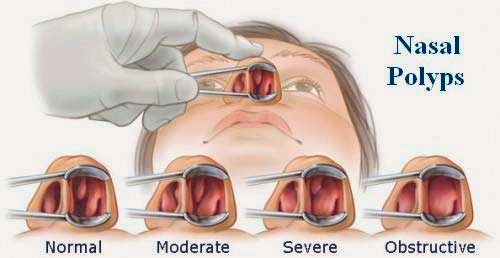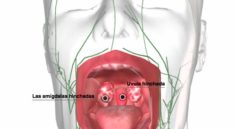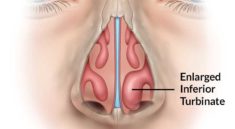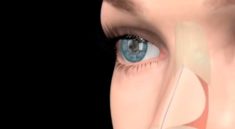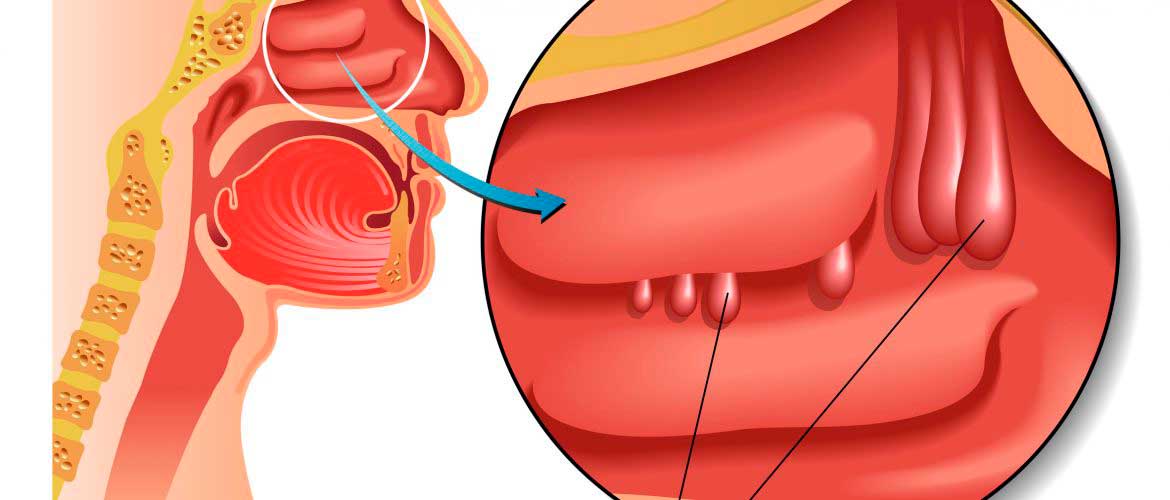
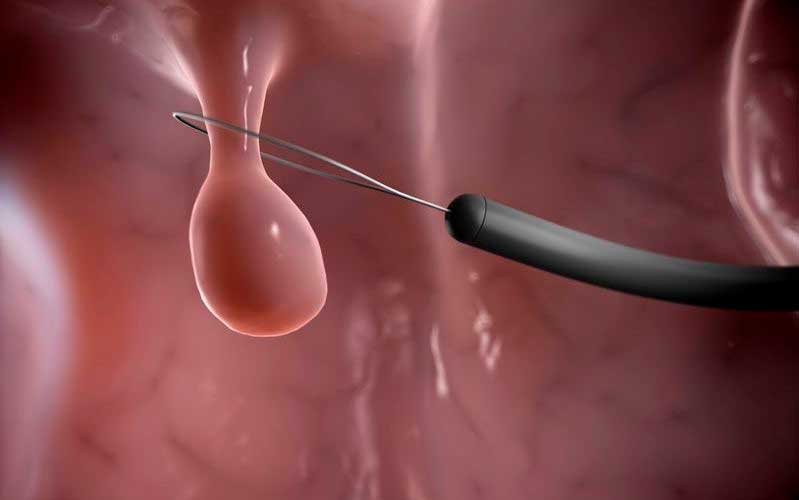
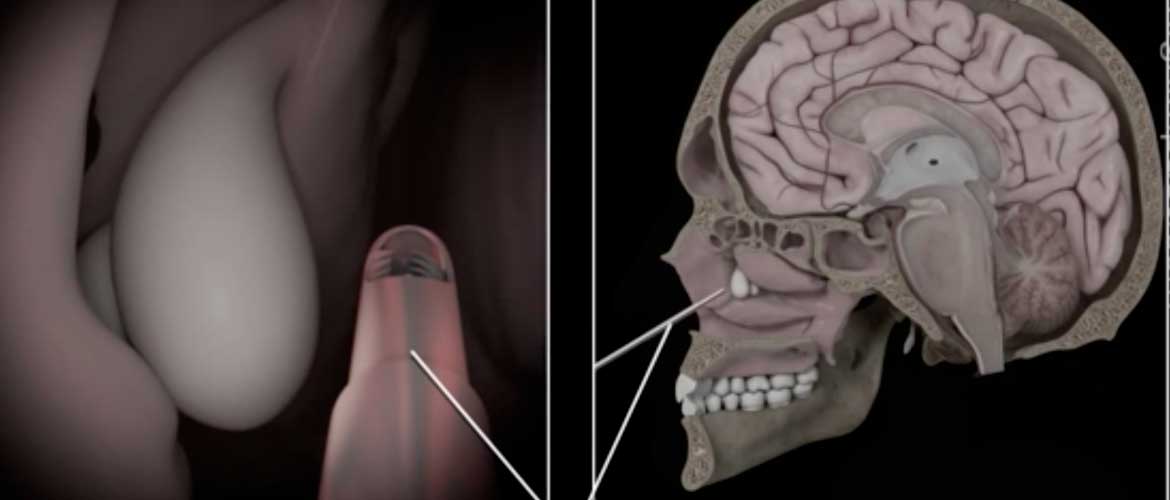
INFORMATION
Nasal polyps are soft, painless, noncancerous growths on the lining of your nasal passages or sinuses. They hang down like teardrops or grapes. They result from chronic inflammation and are associated with asthma, recurring infection, allergies, drug sensitivity or certain immune disorders.
Small nasal polyps may not cause symptoms. Larger growths or groups of nasal polyps can block your nasal passages or lead to breathing problems, a lost sense of smell and frequent infections.
Nasal polyps can affect anyone, but they’re more common in adults. Medications can often shrink or eliminate nasal polyps, but surgery is sometimes needed to remove them. Even after successful treatment, nasal polyps often return.
Symptoms
Nasal polyps are associated with irritation and swelling (inflammation) of the lining of your nasal passages and sinuses that lasts more than 12 weeks (chronic sinusitis).
However, it’s possible to have chronic sinusitis without nasal polyps.
Nasal polyps themselves are soft and lack sensation, so if they’re small, you may not be aware you have them. Multiple growths or a large polyp may block your nasal passages and sinuses.
Common signs and symptoms of chronic sinusitis with nasal polyps include:
- A runny nose
- Persistent stuffiness
- Postnasal drip
- Decreased or absent sense of smell
- Loss of sense of taste
- Facial pain or headache
- Pain in your upper teeth
- A sense of pressure over your forehead and face
- Snoring
- Frequent nosebleeds
Surgery
Surgery is only used if the polyps are very large, or if the patient has not responded well to other treatments.
This is the most common procedure for the removal of polyps. The patient is given either a local or general anesthetic. A long, thin tube with a video camera is inserted into the patient’s nose and sinuses.
Polyps are then cut out using micro-telescopes and surgical instruments. Sometimes, the surgeon may remove small pieces of bone from the nose to open up the nasal passageway.
After surgery, the patient will most likely be prescribed a corticosteroid nasal spray to help prevent recurrence. Some doctors recommend the use of a saline (saltwater) rinse to help post-surgical healing.
Complications
Sometimes, a large polyp, or cluster of polyps, can block the flow of air and draining of fluids from the sinuses or nasal cavity; this can lead to the following possible complications:
- Chronic or frequent sinus infections.
- Obstructive sleep apnea.
- The structure of the face may be altered, leading to double vision. Sometimes, the eyes may be set wider apart than normal (more common in patients with cystic fibrosis).
Prevention
Humidity – if the air in your home is dry, consider using a humidifier.
Hygiene – regular and thorough handwashing reduces the risk of having a bacterial or viral infection, resulting in fewer cases of inflammation of the sinuses and nasal passages.
Irritants – avoiding irritants, such as some allergens, chemicals, and airborne pollutants (which cause inflammation) may help some people reduce their risk of developing polyps.
Management of asthma and allergies – patients who follow their doctor’s recommendations regarding asthma and/or allergy treatment are less likely to develop nasal polyps.
Nasal lavage or nasal rinse – rinsing the nasal passages with a nasal lavage or saline spray will help improve the flow of mucus and remove irritants and allergens.
How long does it take to recover from nasal polyp removal?
about two weeks
In conclusion, the average time for recovery from Nasal Polyp Surgery is about two weeks. If you follow these tips you should quickly be able to return to your normal activities. Most patients notice better breathing soon after surgery. It is important to attend your scheduled follow-ups after the procedure.
How painful is nasal surgery?
Most patients manage sinus surgery pain with oral pain pills. … It can be painful when your doctor removes the nasal packing from your nose at a follow-up appointment after surgery. This is because tissue and fluid inside your nose can stick to traditional packing material as the nose heals.
How should I sleep after sinus surgery?
The first night after surgery, elevate your head with extra pillows or sleep in a recliner. If you have packing material and splints in your nose, make sure they stay in place. If the packing gets clogged, breathe through your mouth. Do not remove the packing or splints.
How long should you bleed after sinus surgery?
Bleeding: It is normal to have some bloody discharge for the first 3-5 days after sinus surgery, especially after you irrigate your sinuses. If steady bleeding occurs after surgery, tilt your head back slightly and breathe through your nose gently. You may dab your nose with tissue but avoid any nose blowing.
How long does sinus surgery last?
The operation may take anywhere from 2 to 3 hours depending on the extent of surgery that is required. An overnight hospital stay is only rarely required. Pain tends to be of the dull achy variety and is well treated with pain medication.
Can I drive after sinus surgery?
This will improve after the first office visit about one week following surgery. Driving: Do not drive within 24 hours of receiving anesthesia. Do not drive while taking prescription pain medication as it may impair you’re driving. Medications: Resume your home medications that are not blood thinners.
Can you shower after sinus surgery?
Avoid any heavy lifting, bending, straining, or stooping for at least 2 weeks after surgery as this may cause bleeding. Light exercise may begin approximately 10 days after surgery. … Avoid particularly hot or steamy showers for several days after surgery. Treat your nose with care.


